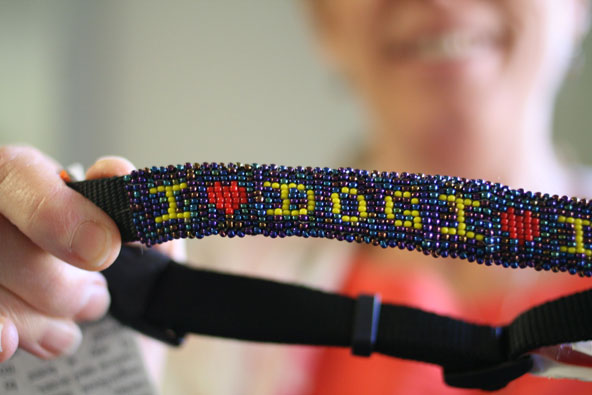
SCOTTSDALE — Rosaries, beaded key chains and earrings. Volunteers use plastic boxes to sort these handmade crafts, though the items don’t always fit. The question these women asked themselves on Nov. 3 was, “What will sell at the First Friday Art Walk?”
The Franciscan Renewal Center has supported crafters through the Apache Fair Trade Co-op for years. Recently, they’ve been working together to establish a solid business model to help the Apache in San Carlos, Ariz., fight poverty on the reservation.
They’re working with the Phoenix and Tucson dioceses and applying for a technical grant from the Catholic Campaign for Human Development, the U.S. bishops’ effort to fight domestic poverty by addressing root causes. Parishes will participate in the national CCHD collection Nov. 17-18.
The Apache burden basket is a popular co-op item, according to Patti Sills-Trausch, director of Faith in Action for the Franciscan Renewal Center. Apache used these baskets, strung with leather straps, for gathering back in nomadic times.
Now, the baskets are used as a symbolic place to put their burdens and hand them over to God. “People hang them in their cars or in their homes, and use them to pray,” Sills-Trausch explained.
Artisans use peridot to create rosaries, bracelets and necklaces. The semi-precious stone created by volcanic activity is found in only a handful of places in the world, one being the San Carlos reservation.
Years ago, members of the tribe would sell peridot in Globe, Ariz., often being underpaid for the value of the stone, according to Deacon Jim Trant, who’s worked with Native Americans for decades.
“They’re Apache,” Deacon Trant said. “They’ve lived a tougher existence.”
Originally, the Apache came from the Alaska region. They migrated to the Midwestern plains, near modern-day Kansas, living largely on buffalo meat. There, after battling the Comanche, they settled in the Southwest.
Unemployment on the San Carlos reservation is high compared to other reservations. The median family income is less than $20,000, according to the U.S. Census, and drugs and alcohol abuse are prevalent. Schools are generally poor, according to Deacon Trant.
“The co-op wants to better their living conditions,” he said. “Once you’re at poverty level, you’re stuck there.” Still, he said, family and tradition are so important to the Apache that they’ll pull together what they can and travel 100 miles to get to a pow-wow.
“The goal is to make the co-op sustainable so that, if we were to go away, the business would go on,” Sills-Trausch said.
Another goal is to help older Apache pass on tradition to the next generation, Sills-Trausch said. Some of the crafts, like beaded dog collars, are somewhat of a fusion between the traditional and the marketable.
The dog and cat collars, for example, are sold before and after the annual pet blessing at the Franciscan Renewal Center. Many of the traditional artisans are resistant to changing their craft in this way.
Eventually, the co-op would like to hire a couple people to organize and market the business and navigate the cultural obstacles.
“We have to learn how to work with them and they have to learn how to work with us,” Sills-Trausch said. “We’re building relationships that help us understand a different people through this cross-cultural effort.”
Supporters buy crafts at the Franciscan Festival in October and at St. Mary’s Basilica near Mother’s Day and Father’s Day. Our Lady of Joy Parish in Carefree will have crafts available at their bazaar in December.
The Franciscan Renewal Center is having an Apache Festival Dec. 1 featuring Apache dancers and crafts. Artisans will sell their crafts after Masses Dec. 2.
“People want the story, they want to meet the person,” said Kathy Luger, director of CCHD for the Phoenix Diocese. “And for the artisan, it helps reinforce their self-esteem and their dignity. They learn skills doing this.”
Getting the Apache involved in all levels is a matter of subsidiarity, a principle of Catholic social teaching that calls for involvement of individuals. The mission, according to Luger, is to help them get out of poverty in a way that’s respectful of their culture.
“By learning the craft of their ancestors, they’re going deeper into their culture — and then they share the beauty of that culture with others,” Luger said. “But the Apache need to be the catalyst.”
“Starting a business from poverty is different, it’s harder,” Sills-Trausch said. “CCHD is providing the support. The goal is to help the Apache be successful.”
—
When: Nov. 17-18
Web: bit.ly/cchd-2012






